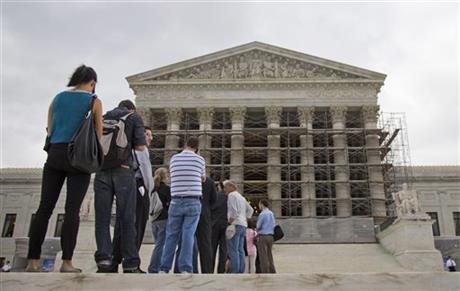
FILE – This Oct. 7, 2013 file photo shows people wait in line to enter the Supreme Court in Washington. The Supreme Court asks God for help before every public session. Now the justices will settle a dispute over prayers in the halls of government. The case before the court involves prayers said at the start of town council meetings in Greece, N.Y., outside of Rochester. It is the court’s first legislative prayer case since 1983, when the justices said that an opening prayer is part of the nation’s fabric and not a violation of the First Amendment. The federal appeals court in New York held that the town violated the Constitution by opening nearly every meeting over an 11-year span with prayers that stressed Christianity. (AP Photo/ Evan Vucci, File)
WASHINGTON (AP) — The Supreme Court is wrestling with the appropriate role for religion in government in a case involving prayers at the start of a New York town’s council meetings.
The justices engaged in a lively give-and-take Wednesday that highlighted the sensitive nature of offering religious invocations in public proceedings that don’t appeal to everyone and of governments’ efforts to police the practice.
The court is weighing a federal appeals court ruling that said the Rochester suburb of Greece, N.Y., violated the Constitution because nearly every prayer in an 11-year span was overtly Christian.
The tenor of the argument indicated the justices would not agree with the appellate ruling. But it was not clear what decision they might come to instead.
THIS IS A BREAKING NEWS UPDATE. Check back soon for further information. AP’s earlier story is below.
A challenge to prayers at the start of a New York town’s council meetings is the Supreme Court’s latest attempt to find the appropriate role for religion in government.
The justices are hearing arguments Wednesday over opening prayers in the Rochester suburb of Greece, N.Y., that a federal appeals court said violated the Constitution because nearly every prayer in an 11-year span was overtly Christian.
Greece is being backed by the Obama administration and many social and religious conservative groups in arguing that the court settled this issue 30 years ago when it held that an opening prayer is part of the nation’s fabric and not a violation of the First Amendment. Some of those groups want the court to go further and get rid of legal rules that tend to rein in religious expression in the public sphere.
On the other side are the two town residents who sued over the prayers and the liberal interest groups that support them. Greece residents Susan Galloway and Linda Stephens say they and others who attend the meetings are a captive audience and should not be subjected to sectarian prayers.
At its broadest, the outcome could extend well beyond prayer and also affect holiday displays, aid to religious schools, Ten Commandments markers and memorial crosses. More narrowly, the case could serve as a test of the viability of the decision in Marsh v. Chambers, the 1983 case that said prayer in the Nebraska Legislature did not violate the First Amendment’s clause barring laws “respecting an establishment of religion,” known as the Establishment Clause.
In Greece, every meeting was opened with a Christian-oriented invocation from 1999 through 2007, and again from January 2009 through June 2010. In 2008, after Galloway and Stephens complained, four of 12 meetings were opened by non-Christians, including a Jewish layman, a Wiccan priestess and the chairman of the local Baha’i congregation.
The two residents filed suit and a trial court ruled in the town’s favor, finding that the town did not intentionally exclude non-Christians. It also said that the content of the prayer was not an issue because there was no desire to proselytize or demean other faiths.
But a three-judge panel of the 2nd U.S. Circuit Court of Appeals said that even with the high court’s 1983 ruling, the practice of having one Christian prayer after another amounted to the town’s endorsement of Christianity.



